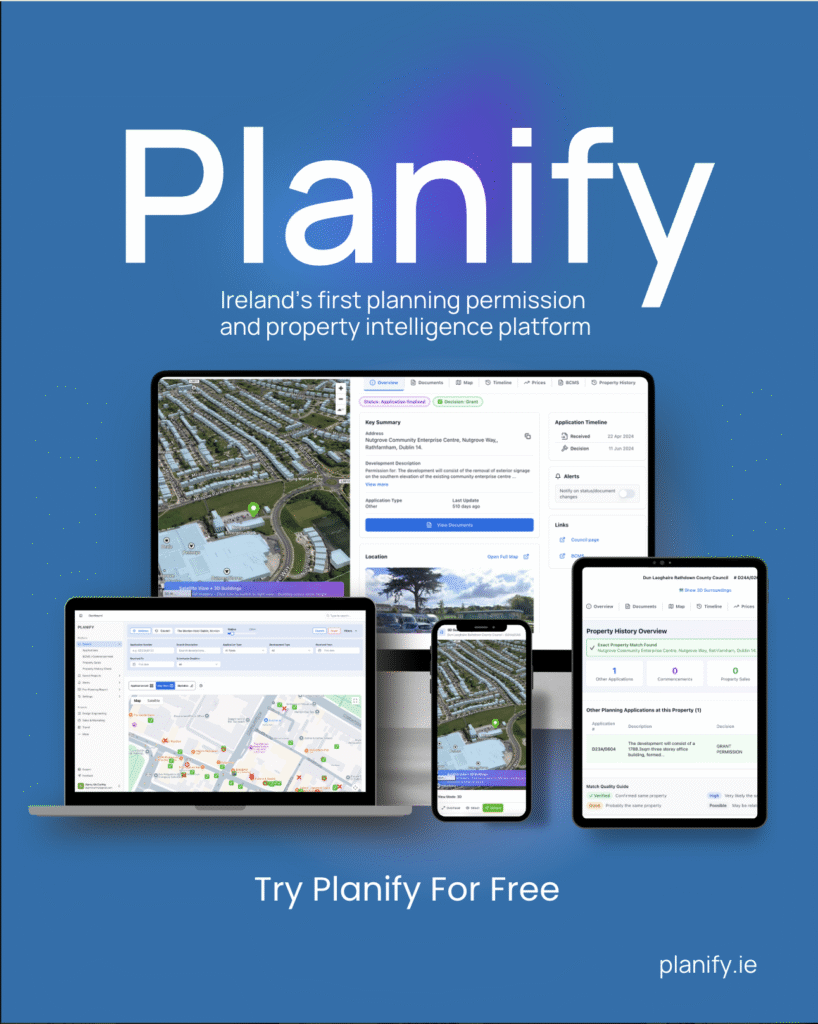Ireland’s Planning Permission Push: 300,000 Homes by 2030
Ireland’s government has unveiled an ambitious housing strategy targeting the delivery of over 300,000 new residential units by the end of 2030, representing a significant shift in the nation’s approach to addressing its housing crisis.
Housing Minister James Browne, alongside Taoiseach Micheál Martin and Tanaiste Simon Harris, launched the plan titled “Delivering Homes, Building Communities” on November 13, 2025. The initiative aims to construct approximately 50,500 homes annually, with particular emphasis on tackling family homelessness. In September 2025, official figures recorded 5,238 children in emergency accommodation—the highest number ever documented in the state. The government has committed to removing children from housing waiting lists as a priority, signaling a reorientation of policy toward vulnerable populations.
The strategy divides into two core components: land activation for housing development and targeted support for vulnerable groups, including those in emergency accommodation and older adults. Critically, the plan increases the annual social housing target by 1,800 units to reach 12,000 per year. Additionally, 90,000 starter homes are proposed over five years—approximately 18,000 annually—addressing affordability barriers for first-time buyers entering the property market. These interventions align with planning permission reforms designed to accelerate housing scheme approval processes at local authority level.
Minister Browne emphasized that the government has removed administrative barriers over the preceding eight months but now faces challenges requiring European Union-level intervention. State aid rules currently restrict the funding government can allocate to Approved Housing Bodies, creating a bottleneck for social housing expansion. The minister acknowledged these constraints while positioning the plan as a comprehensive response to structural housing deficits accumulated over previous decades.
Opposition parties in Dáil Éireann voiced substantial skepticism regarding the plan’s feasibility. Sinn Féin’s Eoin Ó Broin challenged the government’s credibility, noting that previous annual targets of 40,000 homes remained unmet. Central Bank projections suggest only 36,000 homes will be delivered in 2026 and 40,000 in 2027, leaving approximately 200,000 units required in the plan’s second half—effectively doubling current construction rates. Critics argue the private sector lacks both capacity and incentive to meet these accelerated targets, particularly as construction activity declines month-on-month.
Labour’s Conor Sheehan and other opposition representatives contended that the 12,000 social housing unit target represents insufficient ambition, falling short of the 15,000 units recommended by housing commissions and opposition manifestos. This debate underscores tensions between government projections and independent assessments regarding realistic delivery schedules. Environmental impact considerations and material contravention protocols embedded within planning frameworks may further constrain construction timelines, requiring careful coordination with An Bord Pleanála decision-making processes.
Taoiseach Martin characterized the initiative as “the most unprecedented investment in housing ever,” positioning it within a broader economic development narrative. However, implementation success will depend on coordinated action across multiple sectors: private developers, local authorities, construction workers, and financial institutions. Land availability and flood-risk development assessments remain critical variables affecting site viability and planning permission timelines across Ireland’s regions.
The plan’s approval by Cabinet preceded its formal Dublin launch, signaling executive commitment to the framework. Treasury allocations and legislative amendments required to expedite planning approval mechanisms will emerge as defining factors in determining whether the 303,000-home target remains aspirational or achievable.
Originally reported on Sun, 16 Nov 2025 07:01:20 +0000. Full story







